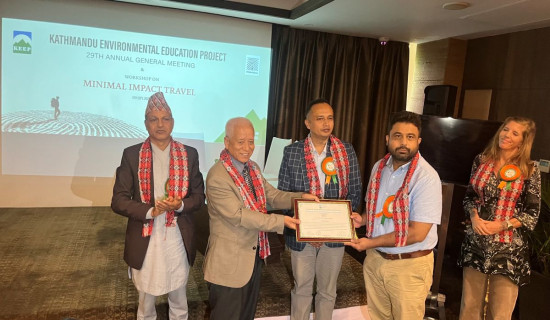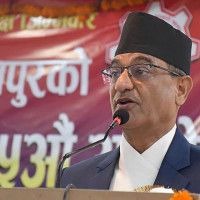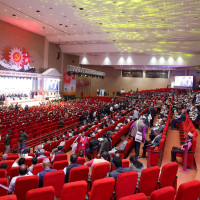- Saturday, 6 September 2025
Fruitful China Visit
Prime Minister KP Sharma Oli has returned home after concluding his five-day visit to China. There, he attended the 25th Summit of the Shanghai Cooperation Organisation (SCO) as well as a commemorative ceremony and military parade held at Tiananmen Square, Beijing, marking the 80th anniversary of the Chinese people's victory in World War II against fascism and an invasive force.
During his visit, Prime Minister Oli held bilateral meetings with the heads of state or government from Vietnam, Cambodia, Russia, Laos, and the Maldives. Discussions focused on enhancing cooperation in trade, investment, technology, tourism, education, culture, and aviation connectivity. During the talks, commitments were made to work together on mutually beneficial issues and to strengthen people-to-people ties. Agreements were also forged for participating countries to collaborate in the fields of trade and investment, science and technology, innovation, digitalisation, climate change, sports, education, culture, and air connectivity.
Crucially, the countries also agreed to promote the interests of Landlocked Developing Countries (LLDCs) and Least Developed Countries (LDCs). Nepal, being one such country, stands to benefit significantly once hurdles standing in its way are cleared through collective effort. By all accounts, the visit has been successful on several fronts.
First, by raising the longstanding issue of Lipulek – a border pass in Nepal's territory – in his meeting with Chinese President Xi Jinping, and calling for its amicable solution, groundwork has been laid for the settlement of the dispute. Second, Prime Minister Oli's talks with the President and Vice President of China, as well as the heads of state and government of various other countries, have made a significant contribution to further enhancing Nepal's standing in the international arena.
Third, in a welcome development, the discussion during Prime Minister Oli's meeting with Russian President Vladimir Putin centred on promoting mutually beneficial cooperation in the fields of trade, investment, education, culture, and air connectivity. Having established diplomatic ties in 1956, the two old friends enjoy a time-tested friendship. Russia had played an instrumental role in assisting Nepal in its infrastructural, industrial, and educational development. With President Putin expressing his keenness to repeat such assistance, the meeting has rekindled the fire of this friendship.
Addressing the conference of the world’s largest regional organisation, which also witnessed the largest gathering of leaders in its history, Prime Minister Oli has not only expanded the diplomatic outreach of Nepal but has also been successful in burnishing the nation's international standing. Moreover, in the context that the conference saw the convergence of the world's superpowers alongside other major powers, our participation held significance in its own right. Making oneself heard on the platform and making a call for concrete action is an attempt to ensure that our interests are not dismissed in a shifting world order.
This also ensures that we as a country will not be sidelined amid global upheavals unleashed by burgeoning trade wars and protectionist policies rolled out to secure one's own interests at the expense of others. However, the real success lies in translating the commitments made into tangible outcomes. In a rapidly changing world where climate change has emerged as an existential threat to humanity and where regional collaboration has never been more important to achieve sustainable development, the SCO Summit has, arguably, paved the way for countries to work in tandem.







copy-square-thumb.jpg)









